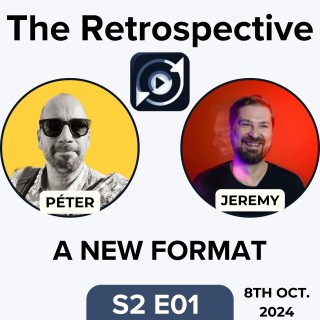Jeremy: Hey, Peter.
Péter: Hey, Jeremy.
Good to see you in person.
Jeremy: Yeah, this is this is the bizarre to be
Péter: it's a first
Jeremy: live in person together.
Péter: Yeah.
Jeremy: And yeah, this is episode one
Péter: yeah.
Jeremy: Of season two.
And actually it would have been episode zero, but.
The podcasting gods do not allow a season's episode zero of anything
Péter: for some weird reason.
Jeremy: So, so yeah really this is a short episode.
We wanted to talk about what our are reflections on the last season.
Yeah.
And what we're thinking about on this season.
Péter: Yeah, and then just explain a little bit and maybe discuss because
we didn't specify all the details, but just explain a bit where we want to go.
So how was season one for you?
Jeremy: I, so first of all, I think one of the, the birth of
season one was really from our,
Péter: Yeah.
Jeremy: Conversations that we enjoyed so much.
And at times there was some really great stuff in our weekly calls.
Yeah.
We said, let's try a podcast.
Péter: Yeah.
Jeremy: I learned a lot from it.
Yeah.
I got a lot out of doing it.
Péter: Yeah.
Jeremy: I, we went way too long on, we, even when we tried, we went way too long.
Péter: Yeah.
Jeremy: And honestly I found we probably spent a lot of time.
We experimented in different directions.
We started with the live broadcast.
Péter: Oh yeah, yeah.
That stopped really quickly.
Jeremy: But there were some advantages to the live broadcast
when it came to the editing.
And then, because we had video as well, the video, the editing with
video was much more complicated.
But I will say that I just my biggest takeaway from season one was I
had a great conversation with you.
But I think a lot of the gold was really deeply buried far and
very inaccessible for people.
Péter: I had a very good feedback coming from someone who said , this
is great because I know you guys.
If I wouldn't know you, I don't think I would listen to this.
And I say, I love this kind of honest feedback and it made me think
that this person was totally right.
Like we have one and a half hour or something like this.
unstructured rambling about important topics with some good thoughts in
there, but even I would struggle if I would want to search for something
and find it back so Yeah, that was one of the big learnings for me also that
even that I also enjoyed a lot are our unstructured discussions and The whole
title of this podcast the retrospective was about just let's do that.
Let's talk about what we wrote about and But still I agree that
we need a bit more structure.
So that's one of the learnings for me also.
Jeremy: Yeah, and I think both of us were, are deeply motivated by the purpose.
Yeah.
And we're finding that this format, or hopefully the format that we're going
to talk about and evolve to, can have a real, like, we want to help people.
That's why we're writing our newsletters.
That's why we're putting stuff out there.
Mhm.
And I think both of us want to have something that can
have a wider reach of impact.
We're not, I mean, we're not thinking about monetization or
anything like that right now.
Or maybe if take a step back.
It would be amazing if stuff that we did on the side and a bit of our spare time
could have a wide enough impact that it's something that could become a day job,
but I think the reality is it's not going to be like that for anytime soon for us,
Péter: I think the emphasis is on the anytime soon.
Like I, at this phase, I'm looking at more of the experimentation and value.
As you said, one of the purposes to help others, I know a lot of entry level
engineering managers who I could help a lot and who you could help a lot and
whose this content can be very useful, but the other value or purpose for me
is just, having this, when I'm preparing for an episode or a topic, I learn a
lot of stuff, I organize my thoughts and just read the newsletter, I think.
It's
Jeremy: exactly, it's a good goal.
Yeah.
Until you write it down, you haven't really learnt it exactly.
Yeah.
And this is, that's the other value I have in all of this.
And I think the format we'll move to is going to accentuate that somehow.
Péter: Exactly.
Let's talk a bit about what we already know we're going to change in season two.
Jeremy: Yeah.
So I think first of all, we're zeroing in much more on, on a persona.
I think we were very broad talking about engineering.
Yeah.
And everything, but I think the persona that's closest to our heart is
engineering managers, people who want to become engineering managers and
people who are in that earlier stage
Péter: like tech leads
Jeremy: Yeah, I mean with our experience, we may touch more on
the more senior end of that as well, but we're really focusing in on,
Péter: yeah,
Jeremy: on that engineering manager.
Péter: Yeah.
I see it as a spectrum like starting from an ambitious IC
and ending somewhere around the.
Starting to think about managing managers,
Jeremy: yeah.
Yeah.
And we feel like that the audio format is,
Péter: oh yeah that's very important.
Like one of the learnings for me was that.
Post processing takes a huge amount of time.
As we are recording this, we still haven't published two episodes from season one.
Jeremy: They're half edited.
Péter: Yeah.
And I think the more content we have, the more time it takes.
And video, it just forces you to be a bit more pedantic and a bit
more, more, spend more time on, on ironing out the little details.
That was one of the learning and the second one was one day I just
put on our podcast in, in, in an audio format, during a walk.
And I got surprised how much easier I can follow the content, how more intimate
it feels just having just the audio.
So I think for these two reasons yeah, let's do audio only in season two.
Jeremy: Yeah, we want to be keeping it simple.
Yeah.
One of the other things is that like in post it's much
easier to correct just audio.
Yeah.
And that kind of thing.
So that's one, the format.
And I think the other format change that we wanted to make is shorter.
Péter: Yeah, definitely.
For sure.
Jeremy: 20, 30 minutes.
Yeah.
Yeah.
And.
I don't know if you want to talk about then the kind of approach that we're
taking in terms of the actual content.
Péter: Yeah, sure.
So, so I think another learning is that we need to be more focused
on the content and more, more have some kind of atomic contents.
Have one episode about one topic.
I think we didn't discuss this before, but I think we are dropping
the topics like talking about news, talking about events, stuff like this.
Jeremy: Yeah.
Péter: I mean, that's interesting for us but everyone can find commentary about
stuff and I feel like we need to really focus on one thing that that, where we
can have an impact and better value.
So what we are planning is having every episode about one topic and the format
we have in mind is, Having engineering leadership challenges as, as topics
for shows like I don't know, for example yeah team focus interruptions
technical interviews we want to get the scope small enough so we can
comfortably cover it in half an hour.
We really feel the risk of scope creep and going too long.
So I think we're going to be very specific in our episodes.
We try to find topics that can be seasonal like that are that are actual now that
Jeremy: yeah, relevant to the world
Péter: that was looking for things.
And and of course, topics where we have concrete firsthand experience
in handling these situations.
Yeah.
So that's the experiment.
I think we're going to have I don't know, eight, 10, 12 episodes in the season.
Awesome.
Another thing is that I really enjoyed, both of us I know, really
enjoyed the interviews we were doing.
One of them was already published, the other one we, it's still in
the pipes, let's just say that.
Jeremy: We had some technical gremlins and we have to re record.
Péter: Yeah, but I really enjoyed the interview situation, so
that's going to be the exception.
I think in season two we're going to do some interviews also.
We already have some ideas.
And and that's going to be an exception, but
Jeremy: Yeah, we really enjoyed the interviews.
They added a dimension and we want to just continue that.
Maybe have them focus on around the topics that we're doing.
Oh yeah, definitely.
Péter: If we invite someone just like before Benoit was
about the four day work week.
This one in the pipes is going to be about being hired.
And and yeah, we have a few ideas.
Jeremy: Obviously, when people hear this, hopefully we'll have
done that interview as the end of
Péter: season one.
Yeah.
Jeremy: We're recording this in in my house in the south of France.
We've been we've spent a few days, Peter's on holiday in France and we managed
to grab a few days together, biking.
Together eating and doing some sightseeing in Montpellier.
Péter: Yeah, no, this was an amazing few days and I think it gave us also a
good opportunity to discuss where are we going to go with this podcast and
maybe do some recordings like this.
Jeremy: Exactly.
So yeah, I think that's it.
You know, that's this might be our shortest podcast episode
that we've ever done, Peter.
But that, I think that's, this is a taste of what we want to have
is a little bit more focus on, and I'm just getting to the meat.
Yeah.
Péter: Yeah.
We will try to keep some kind of regular cadence.
I don't think we settled on weekly or biweekly or what we're going to do.
But.
The goal is to have a regular cadence and some kind of plan of episodes.
So we can already say that the first episode in second season or the second
after this intro is going to be about quiet quitting in a week or two.
And, uh, yeah, see you there.
Jeremy: Yeah.
So thanks to all of those who gave us feedback on season one.
Péter: Thanks, very useful.
Jeremy: And please if you find what we're doing in season two
helpful, please do spread the word.
Like and subscribe, feed the algorithms, you know, because every
other creator tells you what to do.


